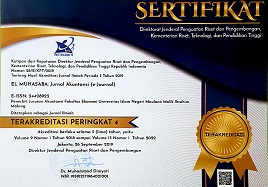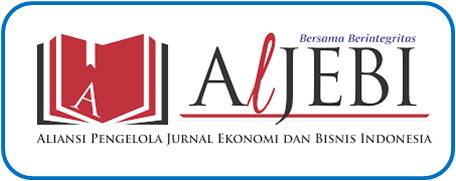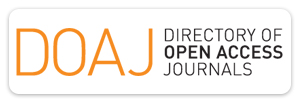FRAUD PREVENTION IN THE PERSPECTIVE OF PROBITY AUDIT (THE CASE STUDY OF UNIVERSITY X)
Abstract
Goods and services procurement in the university sector is a big chance towards fraud case occurrence. Corruption in the university environment resulted in state loss in the amount of two billion rupiahs. Therefore, The internal auditor of University X implements a probity audit as one effort to materialize the procurement system with low fraud possibility. The purpose of this study is to contribute to the understanding of fraud prevention using probity audits on goods and services procurement in the university sector. This research was carried out using a qualitative approach, with a case study method. The data collection was conducted by document analysis and interviews. The data obtained is then reduced, identified, and analyzed. The results conclude that the probity audit in University X is a real-time audit which one conducted in the construction and maintenance stages. Based on the internal auditor evaluation result, a probity audit rated sufficiently to prevent fraud in the goods and services procurement process in the University X.
Keywords
Full Text:
PDFReferences
Peraturan Presiden Nomor 54 tahun 2010 tentang Pengadaan Barang dan Jasa.
Peraturan Badan Pemeriksa Keuangan No. 1 Tahun 2017 tentang Standar Pemeriksaan Keuangan Negara.
ACFE Report to the Nations. (n.d.). 2020. Retrieved June 1, 2021, from https://www.acfe.com/report-to-the-nations/2020/
Arens, A. A., Elder, R. J., & Mark, B. (2012). Auditing and assurance services: an integrated approach. Boston: Prentice Hall.
Capalbo, F., & Palumbo, R. (2012). The imperfect match of public accountability of state-owned enterprises and private-sector-type financial reporting: the case of Italy. Capalbo, Francesco and Palumbo, Riccardo, The Imperfect Match of Public Accountability of State-Owned Enterprises and Private-Sector-Type Financial Reporting: The Case of Italy, Australasian Accounting Business and Finance Journal, 7(4), 2013.
Creswell, J. W. (2010). Research design pendekatan kualitatif, kuantitatif, dan mixed. Yogyakarta: Pustaka Pelajar.
Doig, A. (2014). Roadworks ahead? Addressing fraud, corruption and conflict of interest in English local government. Local Government Studies, 40(5), 670–686.
Earnhart, D., & Leonard, J. M. (2016). Environmental audits and signaling: The role of firm organizational structure. Resource and Energy Economics, 44, 1–22.
Fransisca, S., & Aliya, S. (2019). IMPLEMENTASI AUDIT MUTU INTERNAL ISO 9001 PADA SISTEM MANAJEMEN RSUD KAYU AGUNG KABUPATEN OKI. EL MUHASABA: Jurnal Akuntansi (e-Journal), 10(1), 30–44.
Global Banking Fraud Survey - KPMG Indonesia. (n.d.). 2019. https://home.kpmg/id/en/home/insights/2019/07/the-multi-faceted-threat-of-fraud.html
IHPS BPK SEMESTER II, 2018. (2019). Konsep Persetujuan.
Inawati, W. A., & Sabila, F. H. (n.d.). Pencegahan Fraud: Pengaruh Whistleblowing System, Government Governance dan Kompetensi Aparatur Pemerintah. E-Jurnal Akuntansi, 31(3).
International Standards on Auditing (ISA) 240. (2009). International Standard on Auditing 240 the Auditor ’ S Responsibilities Relating To Fraud in an Audit of Financial Statements. 155–197.
Keerasuntonpong, P., Manowan, P., & Shutibhinyo, W. (2019). Reforming government public accountability: the case of Thailand. Journal of Public Budgeting, Accounting & Financial Management.
Legawa, P. (2016). Analisis Peranan Inspektorat Daerah Dalam Pencegahan dan Pendektesian Fraud pengadaan Barang/jasa Pemerintah Daerah. Universitas Gadjah Mada.
Murwanto, R., Budiarso, A., & Ramadhana, F. H. (2012). Audit Sektor Publik Suatu Pengantar Bagi Pembangunan Akuntabilitas Instansi Pemerintah. Jakarta: LPKPAP.
Ryan, C., & Ng, C. (2002). Australian auditors‐general involvement in probity auditing: evidence and implications. Managerial Auditing Journal.
Setiawan, I. M. H., & Rasmini, N. K. (2021). Penerapan Standar Akuntansi Pemerintahan, Sistem Pengendalian Internal dan Kualitas Pegawai Pada Kualitas Laporan Keuangan. E-Jurnal Akuntansi; Vol 31 No 5 (2021). https://doi.org/10.24843/EJA.2021.v31.i05.p19
Silva, P. (2016). ‘A poor but honest country’: Corruption and probity in Chile. Journal of Developing Societies, 32(2), 178–203.
Sugiyono, M. P. P., & Kuantitatif, P. (2009). Kualitatif, dan R&D, Bandung: Alfabeta. Cet. VII.
Tuanakotta, T. M. (2010). Audit forensik dan audit investigatif. Jakarta: Salemba Empat.
Watch, I. C. (2017). Laporan Akhir Tahun ICW. Jakarta: Antikorupsi. Org.
Westhausen, H.-U. (2017). The escalating relevance of internal auditing as anti-fraud control. Journal of Financial Crime.
Whittle, A., Carter, C., & Mueller, F. (2014). ‘Above the fray’: Interests, discourse and legitimacy in the audit field. Critical Perspectives on Accounting, 25(8), 783–802.
DOI: https://doi.org/10.18860/em.v12i2.12392
Refbacks
- There are currently no refbacks.
Editorial Office:
Megawati Soekarnoputri Building
Accounting Department, Faculty of Economics
Jln. Gajayana 50 Telp (0341) 558881
E-mail: elmuhasaba@uin-malang.ac.id
Universitas Islam Negeri Maulana Malik Ibrahim Malang
E-ISSN 2442-8922
P-ISSN 2086-1249

This work is licensed under a CC BY SA 4.0 International License


















